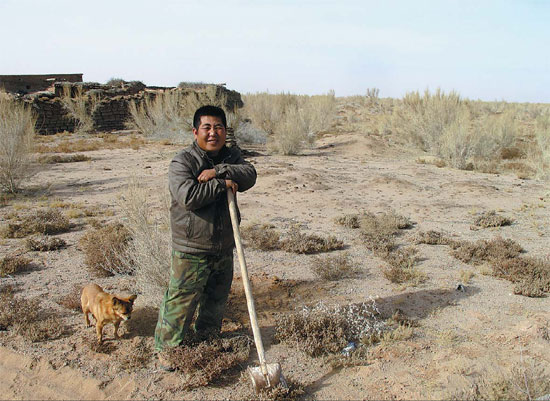
 |
|
Sheng Yuncai is one of the herders-turned-farmers who has shaken off poverty by planting congrong, a medicinal herb, in the Alxa region of Inner Mongolia. Erik Nilsson / China Daily |
Helping men perform better in bed could rejuvenate Alxa's grasslands - and make locals richer than ever. Erik Nilsson reports.
|
|
 |
 |
Congrong has been used in Chinese tonics for millennia to remedy impotence, ejaculation difficulties, groin and knee wounds, and infertility - basically, anything that could afflict a man's nether-regions. Its health benefits were documented by Shennong - the legendary herbalist, "Divine Farmer" and deified doctor from whom mythology says all Chinese descended about 5,000 years ago.
Congrong grows as a parasite on the roots of suosuo, a plant used to reverse desertification.
After a decade of planting thousands of hectares of suosuo, the Tengali, Badanjilin and Lanbuhe deserts have slowed their encroachment into the Alxa grasslands in Inner Mongolia's northwest.
About 60 herdsmen-turned-farmers have planted the cash crop over the past decade through the Japanese NGO the OISCA Institute for Alaxa Ecology's suosuo project, which provides seedlings, funding and knowhow.
It's an effective tactic in a war where the government has tried everything from blasting the sand dunes with "seed storm" payloads to erecting fences to keep sheep from gobbling up the remaining prairie.
And participating locals are earning more than ever. They can make tens of thousands of yuan a year in an area where herders - and especially Alxa's more than 60,000 nomads - earn less than the average annual income of 3,000 yuan ($482).
It takes congrong three years to mature so that Alxa's farmers can sell it fresh for 200 yuan a kilogram and dried for 240 yuan.
The expansion of suosuo planting, led by OISCA, comes as herders are being ejected from the pastoralism they've practiced for centuries. Their livelihood has been starved by the disappearance of their livestock's food source and restricted by government regulations that will limit livestock next year.
Sheng Yuncai earned about 3,000 yuan a year raising sheep until the desert devoured his grassland more than a decade ago.
"Our livestock had nothing to eat," the 40-year-old ethnic Mongolian says.
"We had no idea what to do. We didn't know how we could live."
Over the last 10 years, he planted about 300 hectares of suosuo, beneath which he grows congrong.
"It's good to contribute to our environment. This was grassland for most of my life," he says, waving toward the desert that tumbles beyond the horizon.